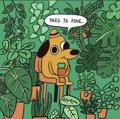Jelly Teacup (they/them) reviewed Woman, Eating by Claire Kohda
Review of Woman Eating
4 stars
Kohda removes all the glamour from being a vampire. There’s no power, just constant, low-level hunger. It’s not the supernatural that feels horrific, it’s the ongoing effort of trying to function while fundamentally out of place. Always managing yourself, always slightly out of sync. I read this like an existential slice-of-life novel and absolutely loved it. The whole story was very realistic, from the relationships to the moral choices to the pacing. It was more like reading someone's journal than a fictional story.
Kohda removes all the glamour from being a vampire. There’s no power, just constant, low-level hunger. It’s not the supernatural that feels horrific, it’s the ongoing effort of trying to function while fundamentally out of place. Always managing yourself, always slightly out of sync. I read this like an existential slice-of-life novel and absolutely loved it. The whole story was very realistic, from the relationships to the moral choices to the pacing. It was more like reading someone's journal than a fictional story.




